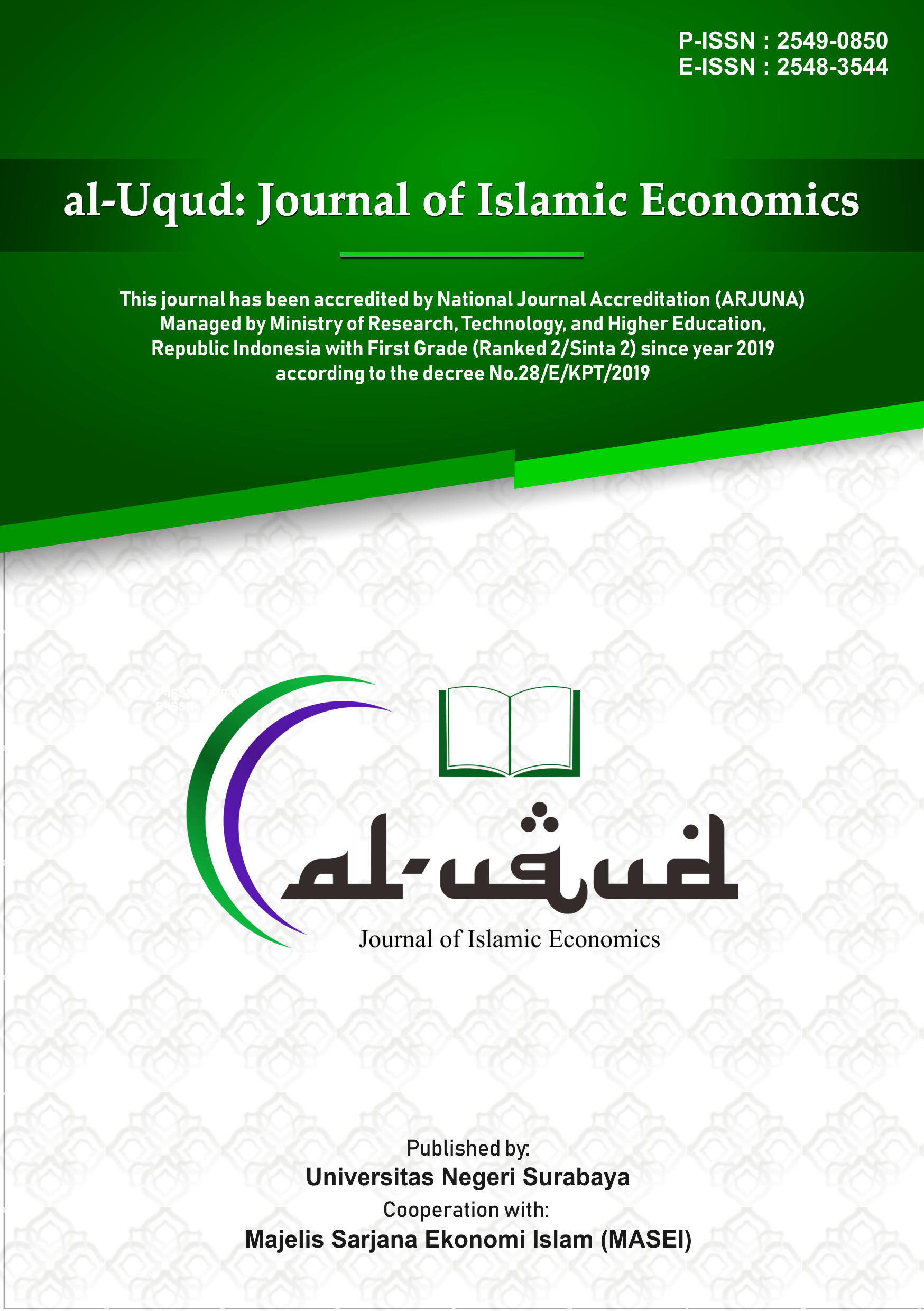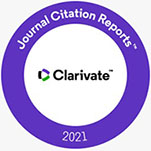Revisiting Green Marketing Implementation in Halal Cosmetic Brands
DOI:
https://doi.org/10.26740/al-uqud.v4n2.p285-306Keywords:
Green Marketing, Indonesia, Halal Cosmetic BrandAbstract
The growing green consumer who selecting products that socially and environmentally ethical products, encourages cosmetics producers in Indonesia to produce more environmentally friendly product in terms of materials, ingredients, packaging, and even the strategy to promote it. As this market segment continues to grow and develop, cosmetics manufacturers are required to be more competitive by applying green marketing values. Therefore, this study aims to investigate how halal cosmetic brands applying green marketing based on the concept of green marketing strategy and Islamic Marketing Ethics (IME). This case study uses a qualitative research approach that selecting four top halal cosmetic brands that marketed in Indonesia. Data was analyzed by data triangulation and method triangulation approach and presented in inductive summary. The results of the study concluded that among the top four halal cosmetics brands studied, two brands had implemented the concept of green marketing strategy and implementation comprehensively (shaded green and extreme green), while the other two brands applied lean green and defensive marketing strategy and implementation. The implication of this research is to provide suggestion to managerial marketing about how to create a more captivating halal products for all customers. The novelty of research proposes how is the level of Indonesian halal cosmetic brands green strategy that applying Islamic Marketing Ethics (IME).References
Abdullah, Kalthom. (2008). Marketing mix from an Islamic perspective. Petaling Jaya: Prentice Hall.
Abdullah, K. and Ismail Ahmad, M. (2010). Compliance to Islamic marketing practices among businesses in Malaysia. Journal of Islamic Marketing, Vol. 1 No. 3, pp. 286-297.
Abzari, M., Safari Shad, F., Abedi Sharbiyani, A. A., & Parvareshi Morad, A. (2013). Studying the effect of green marketing mix on market share increase. European Online Journal of Natural and Social Sciences: Proceedings, 2(3 (s)), pp-641.
Afzal-ur-Rahman, M. A. (1975). Economic doctrine of Islam (Vol. 11). Lahore: Islamic Publication Ltd.
Ahmad, S. F. (1991). The ethical responsibility of business: Islamic principles and implications. Journal of objective studies, 3(1), 23-43.
Al-Bukhari, M. (1978). Sahih al-Bukhari. Dar Ul-Hadith.
Ali, A. (2001). Al-Qur'an. Princeton University Press.
Ali, S., Halim, F., & Ahmad, N. (2016). Beauty premium and halal cosmetics industry. Journal of Marketing Management and Consumer Behavior, 1(4). pp. 52-63.
Altrichter, H., Feldman, A., Posch, P. & Somekh, B. (2008). Teachers investigate their work; An introduction to action research across the professions. Routledge (2nd edition).
Arifin, Johan. (2009). Etika Bisnis Islami, Semarang: Walisongo Press.
Arseculeratne, D., & Yazdanifard, R. (2014). How green marketing can create a sustainable competitive advantage for a business. International business research, 7(1), 130. : http://dx.doi.org/10.5539/ibr.v7n1p130
Asyraaf, Muhammad Dawwabah. (2007). Bisnis Rasulullah. Semarang: Pustaka Nuun.
At-Tirmidzi, A. I. M. B. (2013). Isa. Ensiklopedia Hadits 6; Jamiat-Tirmidzi.
Beekum, Rafik Issa. (2006). Etika Bisnis Islami . Pustaka Belajar.
Bukhari, S. A. A., Hashim, F., Amran, A. B., & Hyder, K. (2019). Green Banking and Islam: two sides of the same coin. Journal of Islamic Marketing.
Chan, E. S. (2013). Managing green marketing: Hong Kong hotel managers perspective. International Journal of Hospitality Management, 34, 442-461, https://doi.org/10.1016/j.ijhm.2012.12.007
Chaudhry, Muhammad Sharif. (2012). Sistem Ekonomi Islam, Jakarta; Kencana Predana Media Group.
Chin, C. H., Chin, C. L., & Wong, W. P. M. (2018). The implementation of green marketing tools in rural tourism: the readiness of tourists?. Journal of Hospitality Marketing & Management, 27(3), 261-280, https://doi.org/10.1080/19368623.2017.1359723
Chin, J., Jiang, B. C., Mufidah, I., Persada, S. F., & Noer, B. A. (2018). The investigation of consumers behavior intention in using green skincare products: a pro-environmental behavior model approach. Sustainability, 10(11), 3922, https://doi.org/10.3390/su10113922.
Dalstrom, M. (2013). Shadowing Modernity: The Art of Providing Mexican Healthcare for Americans. Ethnos, Vol. 78, pp. 75-98, available at: https://doi.org/10.1080/00141844.2012.688760.
Davari, A., & Strutton, D. (2014). Marketing mix strategies for closing the gap between green consumers' pro-environmental beliefs and behaviors. Journal of Strategic Marketing, 22(7), 563-586, https://doi.org/10.1080/0965254X.2014.914059
Departemen Agama.. (2008). Tafsir dan Terjemahan Lengkap Al Quran 30 Juz. Jakarta: Kementrian Agama Republik Indonesia.
Delafrooz, N., Taleghani, M., & Nouri, B. (2014). Effect of green marketing on consumer purchase behavior. QScience Connect, 2014(1), 5, https://doi.org/10.5339/connect.2014.5
Dincer, C., & Dincer, B. (2014). An Overview and Analysis of Marketing Ethics. International Journal of Academic Research in Business and Social Sciences, 4(11), 151-158, : http://dx.doi.org/10.6007/IJARBSS/v4-i11/1290
Ginsberg, J. M., & Bloom, P. N. (2004). Choosing the right green marketing strategy. MIT Sloan management review, 46(1), 79-84.
Global Business Guide Indonesia. (2014).Halal Implementing regulation: Where are they now?. Retrieved from http://www.gbgindonesia.com/en/main/legal_updates/halal_implementing_regulations_where_are_they_at_now.php
Global Business Guide Indonesia. (2018). Indonesias Cosmetics Industry: The Rise of Halal Cosmetics. Retrieved from http://www.gbgindonesia.com/en/manufacturing/article/2018/indonesia_s_cosmetics_industry_the_rise_of_halal_cosmetics_11842.php
Grant, John. (2007). The Green Marketing Manifesto. John Wiley & Sons, Ltd., West Sussex, England.
Hasan, Ali. (2009). Manajemen Bisnis Syariah . Yogyakarta: Pustaka Pelajar.
Hassan, A., Chachi, A., and Latiff, S. A. (2008). Islamic Marketing Ethics and Its Impact on Customer Satisfaction in the Islamic Banking Industry. J.KAU: Islamic Economics, 21(1), 23-40
Hassan, M. H., Hosseinpour, M., Nezakati, H., & Jofreh, M. (2015). Highlighting Influential Factor to Inculcate Green Behaviour. Journal of Applied Sciences, 15(3), 405-410., https://scialert.net/abstract/?doi=jas.2015.405.410
Ishak, M. Abdullah, O. (2012). Islamic Perspective on Marketing Mix. International Journal of Business and Management Studies, 4 (1), 121-131. Retrieved from https://dergipark.org.tr/en/pub/ijbms/issue/26066/274647
Islam, T., & Chandrasekaran, U. (2013). Halal marketing: Growing the pie. International Journal of Management Research and Reviews, 3(12), 3938.
Kamali, M. H. (2012). Environmental Care in Islam: A Quranic Perspective. Islam and Civilisational Renewal (ICR), 3(2), http://www.aalalbayt.org/EnvConference/002.pdf
Ya'Qub, H. (2003). Etos kerja Islami: petunjuk pekerjaan yang halal dan haram dalam syari'at Islam. Pedoman Ilmu Jaya.
Kartajaya, Hermawan & Sula, Muhammad Syakir. (2006). Syariah Marketing. Jakarta; MIZAN.
Kontic, I., & Biljeskovic, J. (2010). Greening the marketing mix: A case study of the Rockwool Group, http://www.diva-portal.org/smash/get/diva2:329044/FULLTEXT01.pdf
Lu, L., Bock, D., & Joseph, M. (2013). Green marketing: what the Millennials buy. Journal of Business Strategy, 34(6), 3-10, https://doi.org/10.1108/JBS-05-2013-0036
Manjunath, G. and Manjunath, Gundupagi, Green Marketing and Its Implementation in Indian Business Organizations (July 1, 2013). Asia Pacific Journal of Marketing & Management Review, Vol. 2 (7), July 2013. Available at SSRN: https://ssrn.com/abstract=3057932
Matthew, V. N. (2014). Acceptance on halal food among non-Muslim consumers. Procedia-Social and Behavioral Sciences, 121, 262-271, https://doi.org/10.1016/j.sbspro.2014.01.1127
Mendleson, N. and Polonsky, M. (1995), "Using strategic alliances to develop credible green marketing", Journal of Consumer Marketing, Vol. 12 No. 2, pp. 4-18. https://doi.org/10.1108/07363769510084867
Mohiuddin, M. G., & Haque, M. S. (2012). Behaving ethically: An essence of Islamic marketing system. European Journal of Business and Management, 4(16), 34-44.
Nashiruddin Al-Albani, Muhammad. (2007). Shahih Sunan Ibnu Majah Buku 2. Jakarta: Pustaka Azzam.
O'Donoghue, T., Punch K. (2003). Qualitative Educational Research in Action: Doing and Reflecting. Routledge.
Osman, A., Othman, Y. H., Salahudin, S. N., & Abdullah, M. S. (2016). The awareness and implementation of green concepts in marketing mix: A case of Malaysia. Procedia Economics and Finance, 35, 428-433, doi: 10.1016/S2212-5671(16)00053-8
Ottman, J. A., Stafford, E. R., & Hartman, C. L. (2006). Avoiding green marketing myopia: Ways to improve consumer appeal for environmentally preferable products. Environment: Science and Policy for Sustainable Development, 48(5), 22-36, https://doi.org/10.3200/ENVT.48.5.22-36
Ramanakumar, K.P.V., Manojkrishnan, C.G, & Suma, S. R. 2012. Consumer Attitude Towards Green Products of FMCG Sector: An Empirical Study. International Journal of Research In Commerce & Management, Vol 3 (2), 34-38
Rezai, G., Mohamed, Z. and Nasir Shamsudin, M. (2012), "NonMuslim consumers' understanding of Halal principles in Malaysia", Journal of Islamic Marketing, Vol. 3 No. 1, pp. 35-46. https://doi.org/10.1108/17590831211206572
Saeed, M., Ahmed, Z.U. & Mukhtar, S. International Marketing Ethics from an Islamic Perspective: A Value-Maximization Approach. Journal of Business Ethics 32, 127142 (2001). https://doi.org/10.1023/A:1010718817155
Saxena, S. (2015). Are they really green: flipping the second side of green marketing coin-a critical analysis using selected cases. Amity Global Business Review, 10(4), 110-113.
Sergius Koku, P. and Savas, S. (2014). On corporate social responsibility and Islamic marketing. Journal of Islamic Marketing, Vol. 5 No. 1, pp. 33-48.
Soonthonsmai, V. (2007, June). Environmental or green marketing as global competitive edge: Concept, synthesis, and implication. In EABR (Business) and ETLC (Teaching) Conference Proceeding, Venice, Italy.
Statista. (2020). Beauty and Personal Care. Retrieved from < https://www.statista.com/outlook/70000000/120/beauty-personal-care/indonesia>
Susanti, V. (2014). Green Marketing: a Review From Islamic Marketing Ethics Perspective. ASAS, 6(1). pp.106-116, https://doi.org/10.24042/asas.v6i1.1711
Sustina. (2003). Perilaku Konsumen dan Komunikasi Pemasaran. Bandung: PT. Remaja Rosdakarya.
Veithzal, Rivai. (2012). Islamic Business and Economic Ethics, Bumi Aksara.
Wilson, J.A. (2012), œThe new wave of transformational Islamic marketing: reflections and definitions, Journal of Islamic Marketing, Vol. 3 No. 1, pp. 5-11.
Wilson, J.A. and Grant, J. (2013), œIslamic marketinga challenger to the classical marketing canon?, Journal of Islamic Marketing, Vol. 4 No. 1, pp. 7-21
Yusoff, M. (2019). Islamic-Based Relationship Marketing: An Integration of Internal and External Marketing. In Islamic Development Management (pp. 173-183). Springer, Singapore.
Downloads
Published
How to Cite
Issue
Section
License
CC BY 4.0 Abstract views: 1136
,
Abstract views: 1136
, PDF Downloads: 1158
PDF Downloads: 1158








